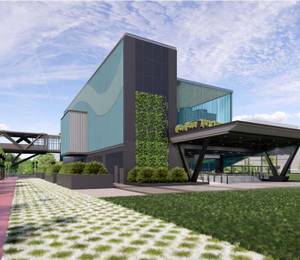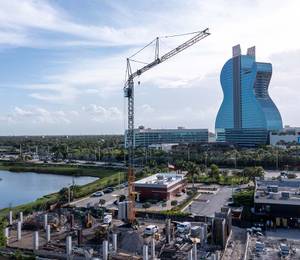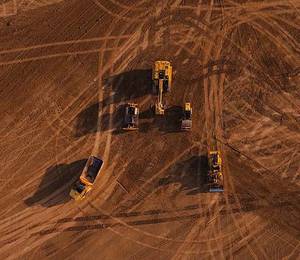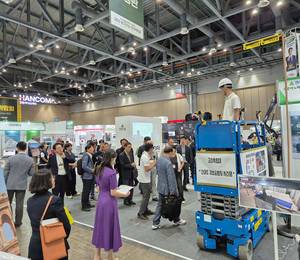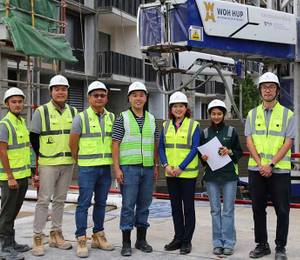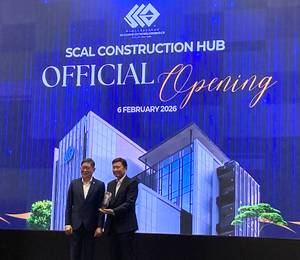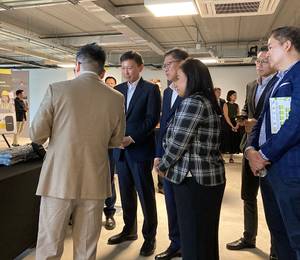Singapore’s Building and Construction Authority (BCA) projects the local construction demand to total between S$23 and S$28 billion in 2021, an improvement from the S$21.3 billion (preliminary estimate) in 2020 during the ongoing Covid-19 pandemic. This announcement was made today (18 Jan) at the annual BCA-REDAS Built Environment and Property Prospects Seminar.
The public sector is expected to contribute about 65% of this year’s total demand, ranging from S$15 to S$18 billion, with an anticipated stronger demand for public housing and infrastructure projects. Among the upcoming developments planned to be awarded in 2021 include various contracts under the Jurong Region MRT Line, the Cross Island MRT Line Phase 1, and the Deep Tunnel Sewerage System Phase 2.
“There will also be around S$6 billion worth of smaller public sector projects which are less than S$100 million in contract value, such as cycling paths, parks, and upgrading works,” revealed Desmond Lee, Singapore’s Minister for National Development, who was guest of honour at the event. “This is comparable with the annual average pre-Covid, and will benefit our smaller and mid-sized contractors.”
The private sector construction demand is projected to vary between S$8 and S$10 billion. BCA forecasts that the bulk of the demand in 2021 will comprise development of the remaining en-bloc residential sites, major retrofitting of commercial developments, and also construction of high-specification industrial buildings to meet business needs.
Furthermore, based on the contracts awarded in the past few years and considering the construction demand forecast for 2021, the total nominal construction output in 2021 is projected to increase to between S$24 and S$27 billion - from the estimated S$19.5 billion in 2020. According to BCA, an anticipated improvement in construction demand in 2021 and the backlog of remaining workloads impacted by the Covid-19 during 2020 will support the projected pickup in total construction output.
BCA also explained that due to the impact of the Covid-19 pandemic, which disrupted project implementation schedules, the preliminary figure for construction demand in 2020 indicated a decline of 36.5% to S$21.3 billion. This was still within the Authority’s revised forecast of S$18 to $23 billion.
The public sector construction demand dropped from S$19.0 billion in 2019 to S$13.2 billion in 2020, as some major infrastructure projects that required more time to assess the pandemic’s impact on resource management and project schedules, were postponed. “For example, the construction of Changi Airport Terminal 5 has been put on hold for two years, until we have more clarity on the future of air travel,” said Mr Lee.
Meanwhile, the private sector construction demand decreased from S$14.5 billion in 2019 to S$8.1 billion in 2020, due to market uncertainties amid the Covid-induced economic recession, stated BCA.
Forecast for 2022 to 2025
BCA expects a steady improvement in local construction demand over the medium term. It is projected to reach between S$25 and S$32 billion per year from 2022 to 2025. According to Mr Lee, this forecast “has not taken into consideration potential new contracts for Changi Airport Terminal 5 and the expansion of the two Integrated Resorts, as these project timelines are still under review due to disruptions from Covid-19.”
The public sector is expected to lead the demand and contributes S$14 to S$18 billion per year from 2022 to 2025, with similar proportions of demand coming from building projects and civil engineering works. These consist of public residential developments as well as large infrastructure and institutional projects such as the Cross Island MRT Line (Phases 2 and 3), the Downtown Line Extension to Sungei Kadut, the cycling path networks, the relocation of Singapore Science Centre, the Toa Payoh Integrated Development, the Alexandra Hospital redevelopment, and a new integrated hospital at Bedok.
The private sector construction demand is expected to improve steadily in the medium term, added BCA, reaching between S$11 and S$14 billion per year from 2022 to 2025. “This is in anticipation of a gradual recovery of the global economy, contingent on the successful deployment and effectiveness of Covid-19 treatment and vaccines, as well as easing of lockdown restrictions.”
Industry transformation through digitalisation
Although 2020 was particularly challenging for the built environment sector, the industry has shown great resilience, said BCA. “The Covid-19 pandemic has necessitated the industry to rethink the way we build to overcome the challenges. BCA will continue to work with our industry partners, led by the trade associations and chambers (TACs), to accelerate industry transformation.”
BCA further pointed out that the Alliance for Action (AfA) on Digitalising Built Environment, an industry-led and government-supported coalition, has identified digitalisation as an important enabler to help the industry build smarter. One of the initiatives introduced by the AfA is the introduction of a set of data standards for the Common Data Environment, which facilitates more seamless information flow for building projects across digital platforms shared by various building professionals and companies along the value chain.
“The AfA targets to invite 300 leading firms in the industry to start adopting digital platforms based on the set of data standards,” said Mr Lee. “Firms can take advantage of funding from the Productivity Solutions Grant to do so. This will have a multiplier effect, as these firms will in turn bring the companies in their supply chains on board the digitalisation journey.”
SMEs can tap on the Productivity Solutions Grant (PSG) to defray the costs of adopting digital solutions pre-approved by the Infocomm Media Development Authority (IMDA) for the construction and facilities management sector, explained BCA. The funding will cover up to 80% of the qualifying cost until 30 September 2021, and subsequently, up to 70% until January 2023. SMEs can make multiple applications for use of different digital solutions subject to a firm level cap of S$30,000.
